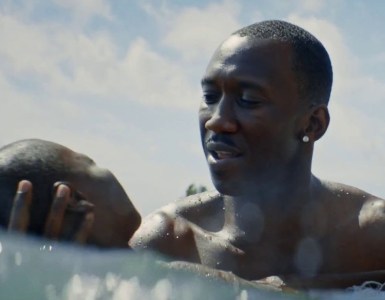Moonlight, Barry Jenkins’ latest film, has drawn widespread critical acclaim, stacking up numerous awards and accolades culminating in the Oscar for ‘Best Picture’ at Sunday’s mis-hap ceremony.
A heartfelt, deeply honest and frankly, important film, Moonlight tells the story of Chiron, a gay, black boy growing up in a deprived Miami neighbourhood, as he struggles with his mother’s drug addiction and searches for self (and social) acceptance. Based on Tarell Alvin McCraney’s autobiographical play In Moonlight Black Boys Look Blue, Jenkins’ adaption is an intimate portrayal of being queer and black. For some audience members this presents a rare opportunity to see an experience on screen that reflects their own.
Moonlight opens with a young Chiron running away from a pack of school bullies; the other boys know there is something different about Chiron before he is old enough to fully comprehend it himself. As a result of that chase, he comes across Juan, a local drug dealer, played by Mahershala Ali, who rightfully won the Oscar for best supporting actor. Ali offers one of the standout performances of the film; forming a paternal relationship with Chiron, Juan tries to help the young boy accept his sexuality and becomes a key figure in his life.
From the opening scenes between Chiron and Juan it is immediately clear that Moonlight is a film that powerfully rejects lazy or racist ‘stock in trade’ portrayals of black characters. The film skilfully and sensitively captures the difficulties of Chiron’s struggle with his own queerness while growing up in a tough, largely black neighbourhood in Miami. In giving Chiron the care, attention and acceptance he so craves, the masculine Juan is the lie to anyone who might claim that the film depicts black communities to be more homophobic than white communities. Set in an all-black world, Jenkins ensures that the complexity and humanity of the characters in Moonlight’s all-black cast take centre stage.
Told in three parts, Moonlight follows Chiron through his childhood (played by Alex Hibbert), teenage years (Ashton Sanders) and finally into adulthood (Trevante Rhodes). This structure could have been clunky, but the character of Chiron is depicted seamlessly by all three actors. Although Chiron’s physique changes dramatically as we watch him develop from a boy, through puberty, and finally into manhood, his vulnerability and longing for acceptance remain. In one particularly poignant moment, we see Chiron apologise for a kiss in a scene that perfectly conveys the relatable experience of feeling the need to apologise just for being you. Indeed, one of the highlights of Moonlight is its depiction of romance: just like in real life, the intimate moments can be awkward and a bit confusing, mixing emotional fulfilment with a continued sense of yearning.
The cinematography is sumptuous throughout, and visually the scenes have a dreamlike feel. This is not, however, a film that can be accused of putting style over substance; cinematography and emotion go hand in hand, whilst the beating Florida sun and the saturated colours give the action an added intensity.
Moonlight has been called a beautiful coming of age story, but it is so much more than that. It is an important and timely addition to the list of films that challenge the limited representation of black and other marginalised people in mainstream media. This is all the more relevant given the current period of heightened racism and all-too-frequent police violence against young black men in the USA and France. The film abandons clichés to skilfully show the experience and tensions of living as a minority within a minority. It’s impossible to expect a film of only two hours to singlehandedly challenge deeply entrenched racial and sexual prejudices, but Moonlight does more than most. It accomplishes the rare feat of being the kind of film that knocks you sideways and leaves you thinking about it long after the credits have rolled.
Featured image: Flickering Myth.











Add comment